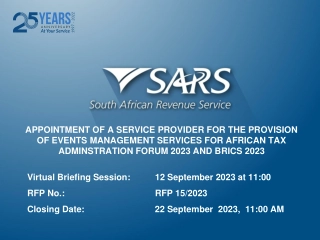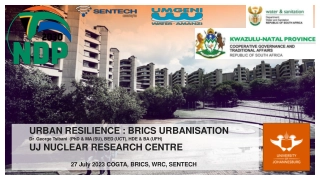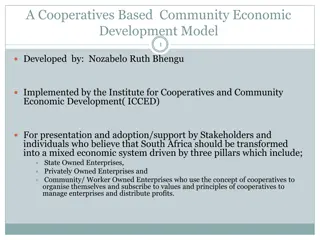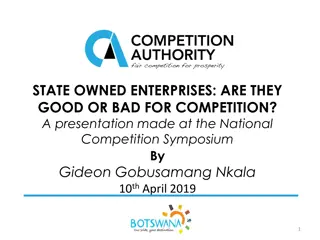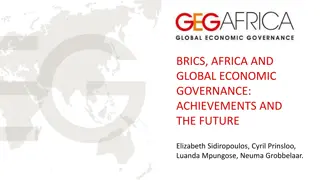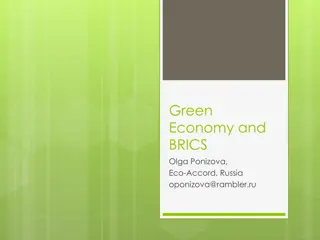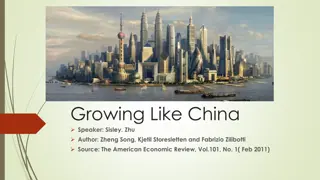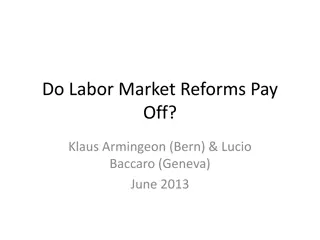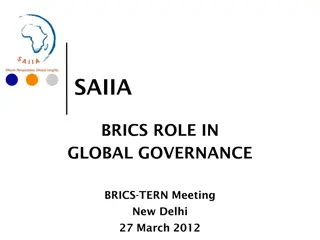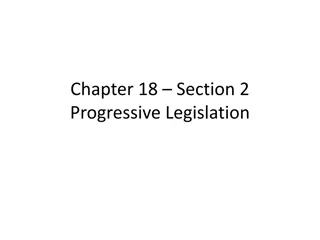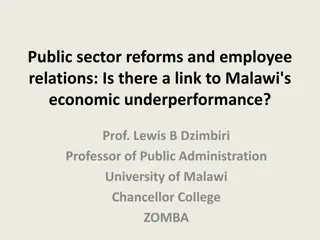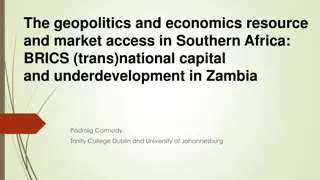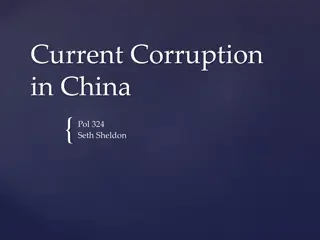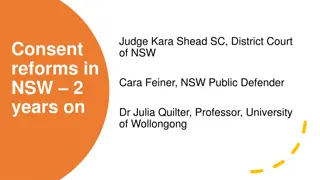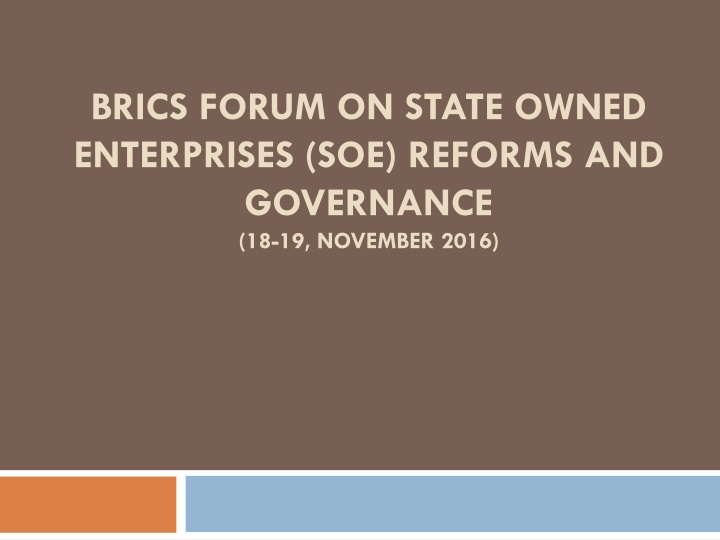
BRICS Forum on State-Owned Enterprises Reforms
Excerpts from the BRICS forum on state-owned enterprises highlighting challenges and strategies for modernization, diversification, talent management, and governance reforms. Presentations from China, Brazil, and South Africa emphasize the need for SOE restructuring, increased efficiency, and international cooperation to enhance market value and sustainability.
Download Presentation

Please find below an Image/Link to download the presentation.
The content on the website is provided AS IS for your information and personal use only. It may not be sold, licensed, or shared on other websites without obtaining consent from the author. If you encounter any issues during the download, it is possible that the publisher has removed the file from their server.
You are allowed to download the files provided on this website for personal or commercial use, subject to the condition that they are used lawfully. All files are the property of their respective owners.
The content on the website is provided AS IS for your information and personal use only. It may not be sold, licensed, or shared on other websites without obtaining consent from the author.
E N D
Presentation Transcript
BRICS FORUM ON STATE OWNED ENTERPRISES (SOE) REFORMS AND GOVERNANCE (18-19, NOVEMBER 2016)
Excerpts from the Inaugural session Challenges of CPSEs: Modernization, Diversification, Adoption of new technologies, Talent Management and Retention, Professionalization of Boards, Increasing Brand Value In terms of market capitalization, China and Brazil seen on the lead with 80% and 35% respectively, and a need for more number of SOEs to be listed is desired As socially responsible entities, reengineering SOEs and improving governance mechanisms needed Increased orientation to efficiency, service delivery, cost effectiveness is felt
Excerpts from the Inaugural session The presentation from South Africa has called for Action plan for cooperation among BRICS member nations Multi national agreements for South-South cooperation Mechanisms for managing the new normal in terms of economic transformation, innovation, coordination and structural reforms Guidelines on SOE reforms in terms of assessment, supervision, selecting senior management and other related matters Implementation plans for targeted interventions to be in place
Excerpts from the Inaugural session Presentation from China has discussed on Further extension of SOE reforms with common principles Work together for excellence in SOEs in improving transparency and efficiency in competitive market space Cooperation with joint efforts increase people to people contacts increase economic efficiency and environment BRICS best practices framework in terms of shareholding, institutional framework and private sector participation
Excerpts from the Presidential remarks Diverse nature of SOEs in India pose a challenge R&D and Innovation to be given a huge thrust which is needed in SOEs Drawing the line between productivity and employment and policy to be mindful of the issue of diversity BRICS consortium to show new direction and the path to SOEs concerned and to the world
Session I Issues and Observations The growth outlook for BRICS countries shows the need for a new growth model to promote stability and unlock investments into the productive and other sectors of the economy ensuring economic development Need highlighted for driving investment in the developing world leading to a desirable outcome on technological investments Promoting equality and accelerating South-South trade
Session I Issues and Observations Need for energy diplomacy / energy cooperation mechanism within BRICS for more energy supply at stable rates. While SOEs are fairly structured organizations across the BRICS nations, it is important to shift from processes to outcomes. On the energy issue, BRICS member nations could develop a mechanism for bargaining a better position outside BRICS framework and collectively strengthen the energy cooperation within BRICS member nations. diplomacy and energy
Session II Issues and Observations SOEs shall focus on investors responsibility to achieve centralized supervision and SOEs have to follow the rule of the market, and make SOEs be independent market players Emphasized the need to increase the number of SOEs in the Global Fortune 500 list.
Session II Issues and Observations There could be collaborations that would aid achievement of critical SOE objectives. There could also be country to country bilateral agreements for capacity building / training, for instance, in the areas of governance
Session III Issues and Observations In SASAC, two basic indicators for assessing SOEs performance : annual assessment : profit and economic value-added(EVA) and tenure assessment Targets are set through vertical and horizontal comparison It is commendable that SASAC has quantified most of its assessment parameters
Session III Issues and Observations In the SA context, over 700 SOEs exist with different portfolios Contracts exist at various levels for performance Executive remuneration and assessments take place at the concerned levels Remuneration standards and bonus/incentives for executives based on the SOE performance
Session III Issues and Observations In India, performance management and evaluation takes place through the Memorandum of Understanding (MoU) Diversity of enterprises in various sectors and various performance levels (profit making and loss making) pose a challenge in arriving at parameters for performance evaluation MoU 17-18 provides for 50% evaluation based on financial parameters and there is freedom with the concerned 50% to choose the rest of the parameters, including non financial parameters MoU has been an evolving phenomenon and there is a need for policy directions in terms of investments and initiatives for change management privatization, R&D
Session III Issues and Observations In the case of Russia, the Federal Property Management Agency, an executive body develop tools and unified mechanism in the field of Corporate Governance companies with state participation for more than 1500
Session IV Issues and Observations Financial Management System in Chinese SOEs highlight: optimize resources allocation and increase capital gain enhance risk management techniques and increase enterprise value creation report their operation objectively, and disclose true accounting information More than 70 SOEs have established financial companies to support SOEs timely, accurately and
Session V - Issues and Observations Most SOEs in China have been corporatized and listed A clear legal system of CG exists in China comprising companies law, enterprise SOE law, property law, securities law CG mechanisms support to optimize the structure of the board Enhance capacity building for boards and improve incentive mechanisms for directors
In India, CSR is mandated for all profit making SOEs Statutory provisions and responsibilities of CSR were highlighted CSR activities includes eradication of poverty, improving primary health, contribution to swach bharat kosh, gender equality, technology incubator and R&D, etc CSR initiative support to achieve inclusive growth Need to develop a Social Vision
Governance framework in Africa highlights on the specific rights of the and boards performance DPE ensures adherence to various compliance issues, governance challenges, internal control and audit outcomes Maintaining balance between enterprise interest and national interest Boards to maintain highest level of transparency

